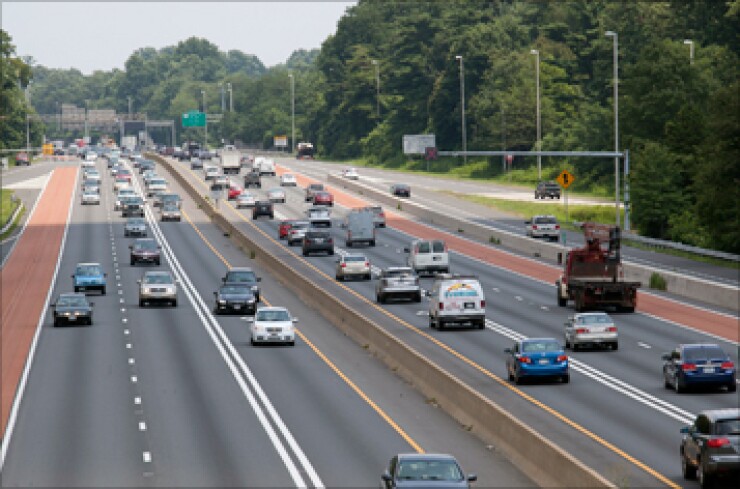
DALLAS — President Obama's revised six-year, $478 billion transportation proposal, delivered to Congress on Monday, would allow states to levy variable tolls on existing roads to alleviate traffic congestion, in addition to removing the long-standing ban on tolling existing interstate highways.
The Grow America Act 2.0, an expanded and extended revision of a similarly named four-year measure by the president in 2014, includes $317 billion for road projects, an increase of 29% from current funding, and $116 billion for mass transit, an increase of 76%. The transportation measure would be supported with $240 billion of fuel tax revenues and $238 billion from a new mandatory 14% transition tax on corporate foreign earnings.
The six-year proposal goes to Congress two months before the lapse of the current $10.8 billion extension of the Highway Trust Fund on May 31.
The new transportation proposal would remove the current federal prohibition of tolls on existing interstate highways if the new revenue is dedicated to road improvements anywhere on a state's system, not just the tolled segment. Revenues generated by road tolls could be used to upgrade mass transit systems within the highway's transportation corridor.
States and other public agencies could also levy variable-priced tolls on existing roads, bridges, and tunnels for congestion management, and could convert high-occupancy vehicle lanes to tolled express lanes.
Transportation Secretary Anthony Foxx said the six-year plan is needed to provide states with long-term funding assurance.
"Our proposal provides a level of funding and also funding certainty that our partners need and deserve," he said. "This is an opportunity to break away from 10 years of flat funding, not to mention these past six years in which Congress has funded transportation by passing 32 short-term measures."
Foxx warned that transportation infrastructure will continue to deteriorate without increased funding.
"I'm not going to sugar-coat it," he said at a transportation forum Monday sponsored by Politico.
"Our road systems are really falling apart. The truth is that after years of under-investment our transportation infrastructure is starting to show cracks."
Foxx conceded that it would be difficult to pass a multiyear transportation bill funded through corporate tax reform before the May deadline, but said the effort is worthwhile.
"We have a bill and it is paid for," he said. "We've got to get out of this box of rooting against ourselves as a country. The answer to the problem is a political one."
Foxx encouraged state and local officials to contract their congressional delegation in support of the president's transportation bill.
"During these next two months, though, all of us who work in Washington need to be relentless in trying to get to 'yes' on a bill that is truly transformative and that brings the country together," he said.
The administration's proposal supports public-private transportation investments by creating an undersecretary position for innovative finance within DOT and raising the cap for federally allocated transportation-dedicated private activity bonds to $19 billion from the current $15 billion, Foxx said.
The six-year bill would provide $77.16 billion of total federal transportation spending in fiscal 2016, rising to $82.3 billion by fiscal 2023. Current spending is about $55 billion a year.
Revenues from federal gasoline and diesel taxes are expected to total $239.3 billion over the period.
The proposal includes a new $6 billion competitive grant program for innovative highway and transit projects and doubles the current funding for the Transportation Investment Generating Economic Recovery discretionary grant program to $7.5 billion.
A new intermodal competitive grants program would provide $18 billion over six years for rail, highway, and port freight movement projects. The measure would also provide $28.6 billion for high performance rail and passenger rail.





